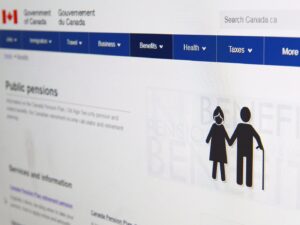Fact File: Most older immigrants don’t get OAS upon arrival, contrary to online claim
By Canadian Press on August 21, 2025.
Attacks on immigrants to Canada continue to proliferate online, with the latest volley coming from a false claim that immigrants aged 65 and up receive a partial old age security (OAS) pension immediately upon arrival in Canada — and that it comes from the pension of citizens. In fact, while there are some exceptions, in order to qualify for OAS the recipient must be a Canadian citizen or legal resident who lived in Canada for at least 10 years.
THE CLAIM
“Canadians will be sacrificing part of their Old Age Pensions to allow elderly immigrants to receive a partial old age pension upon arrival!” reads an
Aug. 16 post to the X platform, formerly Twitter.
Multiple
users reposted the claim to
Facebook. On X, the post received around 9,700 likes and around half a million views, according to the platform’s metrics.
THE FACTS
The X post refers to Canada’s
old age security pension, which is a monthly payment for seniors over the age of 65. Unlike the Canada Pension Plan, recipients don’t need to pay into OAS because it’s funded by general tax revenues.
You can receive OAS while working and you don’t need a work history to qualify.
To qualify for OAS, recipients living in Canada must be 65 or older and a Canadian citizen or legal resident who has lived in Canada for at least 10 years since the age of 18.
Those living outside of Canada need to meet the same age and residence requirements, but need to have lived in Canada for at least 20 years since the age of 18.
This means an immigrant coming to Canada would need to meet citizenship requirements and live in Canada for at least 10 years before receiving OAS.
However, there are some exceptions that could allow an immigrant to get OAS payments before the 10-year residency requirement.
SOCIAL SECURITY AGREEMENTS
Canada has a
social security agreement with more than 50 countries, which allows countries to co-ordinate their pension programs if someone lived and worked in both.
An immigrant could qualify for OAS if they lived in one of the countries Canada has an agreement with or if they contributed to the social security system of one of those countries.
For example, an Indian living in Canada who does not qualify for an OAS pension based on their years of residency in Canada could still qualify for benefits earlier.
Because Canada and India
have a social security agreement, Canada “may
consider periods of contribution” to India’s Employees’ Pension Scheme to help meet the OAS eligibility requirements.
The monthly payment amount still depends on
how long that person lived in Canada after age 18.
People who lived in Canada for at least 40 years qualify for the full pension. Those who lived in Canada for less than 40 years receive a partial payment, which is
calculated by the number of years in Canada divided by 40.
For example, someone who lived in Canada for 16 years would qualify for 16/40ths of the full OAS pension, or 40 per cent.
A
2019 Statistics Canada study using 2016 census data looked at the income of low-income senior immigrants. According to the study, senior immigrants who came to Canada within 10 years of the 2016 census “received little income from public pension sources,” including the OAS.
Those seniors mostly relied on private pension or employment sources, Statistics Canada said.
SPONSORED IMMIGRANTS
The Statistics Canada study noted sponsored immigrants were the group with the “largest dependence on public pension benefits.”
Canadian citizens and permanent residents
can sponsor their parents and grandparents to become permanent residents in Canada. The sponsors commit to financially supporting their parents or grandparents for 20 years (or 10 years in Quebec).
In October,
OAS rule changes agreed upon in 2014 will come into force, limiting the social security benefits sponsored immigrants are eligible for. OAS recipients can get extra benefits like the
guaranteed income supplement if they meet low income requirements.
Under the previous rules, sponsored parents and grandparents became eligible for these extra OAS benefits after 10 years, despite the sponsorship agreement being 20 years.
The new rules mean they can’t get those extra OAS benefits for their entire sponsorship agreement, “regardless of how many years they have resided in Canada.”
Sponsored immigrants still qualify for OAS payments after 10 years.
CLAWBACKS
There is no evidence the government takes OAS pension amounts from citizens’ monthly cheques to give to immigrants. The pension amount received depends on the length of time lived in Canada after the age of 18.
However, the government can
claw back payments. Because OAS is taxable income, recipients might have to pay all or part of it back if they meet a certain income threshold.
This report by The Canadian Press was first published
Aug. 21, 2025.
Marissa Birnie, The Canadian Press
36
-35


I’ am making over $12k a month working online. I kept seeing how some people are able to earn a lot of money online, so I decided to look into it. I had luck to stumble upon something that totally changed my life. After 2 months of searching, last month I received a paycheck for $12853 for just working on the laptop for a few hours weekly. And best thing is…It’s so Easy… This is what I do==>>>follow instructions on this website………………..
.
.
==================>>> https://h1.nu/17iiE